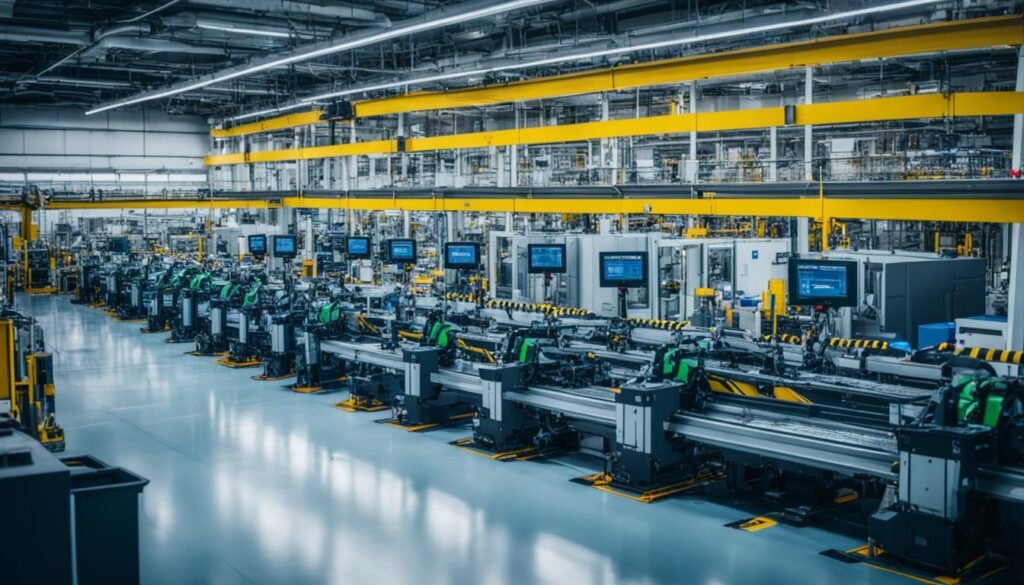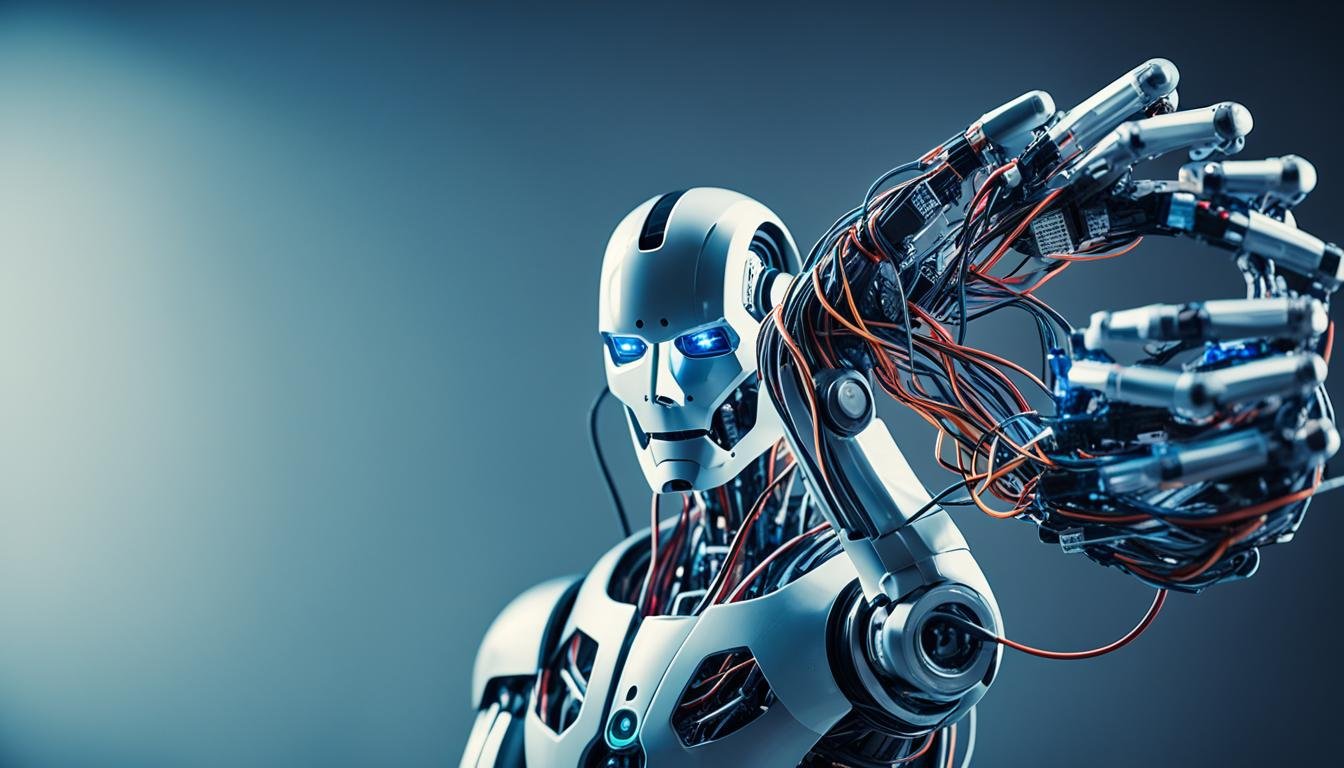By 2030, AI could automate tasks making up to 30% of the work hours in the U.S. economy. This shows how big an impact AI will have on our jobs and lives. AI can lead to job losses, social manipulation, biased decisions, and privacy issues.
AI’s dangers have been a topic in the tech world. Job automation, fake news, and AI weapons are major concerns. Experts like Geoffrey Hinton and Elon Musk warn about AI’s risks to society. They suggest we should slow down AI development to manage its downsides.
Key Takeaways
- AI automation could impact up to 30% of current jobs in the U.S. by 2030.
- AI algorithms can be manipulated to spread misinformation and influence public opinion.
- Lack of transparency in AI decision-making can lead to biased and unsafe outcomes.
- AI-driven social surveillance and data collection raise concerns about privacy violations.
- Socioeconomic inequality may worsen as AI disrupts the job market.
Lack of AI Transparency and Explainability
As AI becomes more common, worries about its lack of transparency and explainability grow. AI models are complex and hard to grasp, even for their creators. This makes us question the data and algorithms used, and the decisions made by AI.
The Zendesk Customer Experience Trends Report shows 65 percent of CX leaders see AI as crucial. Yet, 75 percent of businesses worry that a lack of transparency could cause more customers to leave. To fix this, we need three main things: explainability, interpretability, and accountability in AI.
There are three ways to make AI more transparent: algorithmic, interaction, and social transparency. Laws and standards are being made to make AI systems more open and responsible. This includes the GDPR, OECD AI Principles, GAO AI accountability framework, and the EU Artificial Intelligence Act.
The data used to train AI is key. If the data has biases, these can get worse with the algorithms. Without transparency, it’s hard to spot and fix these biases, leading to unfair or unsafe decisions.
AI transparency is key to gaining trust from customers, employees, and the public. By explaining how AI systems work, companies can improve accuracy, ensure ethical AI, and follow new laws. Finding a balance between being open and efficient is hard, but it’s vital for responsible AI use.

“75 percent of consumers demand more transparency from AI-powered tools, and 36 percent express that companies must provide explanations on the inner workings of AI tools when ethical issues arise.”
Job Losses Due to AI Automation
The rise of artificial intelligence (AI) is changing the job market. It’s making us worry as AI-powered automation spreads across many industries. By 2030, up to 30% of the hours worked in the U.S. economy could be automated. This could hit certain groups and sectors hard.
A recent survey found 37% of businesses said AI replaced workers in 2023. And 44% of companies plan to lay off workers in 2024 because of AI. Workers think 29% of their tasks could be taken over by AI systems. White-collar and clerical workers, making up 19.6% to 30.4% of the workforce, are most affected.
AI-driven automation’s effect on jobs is complex. While some jobs might disappear, AI could also create new ones, especially in healthcare, transportation, finance, and retail. Companies that invest in training their workers could thrive in this new AI world.
| AI Impact on Jobs | Percentage |
|---|---|
| Businesses reporting AI replacing workers in 2023 | 37% |
| Organizations anticipating layoffs in 2024 due to AI | 44% |
| Employees’ work tasks that could be replaced by AI | 29% |
| White-collar and clerical workers as a percentage of the global workforce | 19.6% – 30.4% |
As AI use grows, it’s important for businesses, policymakers, and workers to think about the changes. We need to work together to make the transition smooth and create new jobs. By tackling the issues of ai job displacement, ai automation, and the ai impact on jobs, we can use AI’s benefits while reducing risks. This will help support the future workforce.

Social Manipulation Through AI Algorithms
The rise of artificial intelligence (AI) has led to a worrying trend: manipulating public opinion through social media. AI algorithms on these platforms can spread false information and shape opinions without people realizing it. This makes us question the truth of information and the danger of large-scale manipulation.
In the 2022 election in the Philippines, Ferdinand Marcos Jr. used a TikTok troll army to win over young voters. This shows how AI in social media can be used for political gain. The platform’s algorithm, which shows content based on what users like, can’t always stop harmful or wrong information. This makes the problem worse.
AI is also changing how we see images, videos, and voices online, making it hard to know what’s real and what’s not. These new technologies are affecting politics and society, making it hard to trust media and information sources.
“Manipulation is a morally deplorable act executed by the manipulator at the expense of the manipulated.”
Philosophers have always debated the ethics of manipulation. They say it harms our freedom and dignity. The fact that manipulation can change what we believe and expect is a big concern. It shows we need rules and checks to make sure AI is used right.

As AI gets better, the chance for social manipulation will increase. We need everyone – policymakers, tech companies, and the public – to tackle this issue. We must ensure AI is open and responsible. Strong ethical rules and transparent AI systems are key to handling the risks of this powerful tech.
Social Surveillance With AI Technology
AI technology is getting better, but so are worries about its misuse for watching people. China uses facial recognition in public places, and U.S. police use predictive algorithms. These risks of AI surveillance are getting clear.
There’s a big problem with AI systems not being clear about how they work. Their algorithms are hard to understand. This makes people worry about biased and unsafe decisions, especially for racial minorities.
AI surveillance tools, like facial recognition, can make mistakes. This makes people worry about their privacy and rights. In the U.S. and other countries, there’s a big worry about AI surveillance being used for authoritarian control and creating dystopian surveillance states.
“AI is focused on the way it will adversely affect privacy and security. A prime example is China’s use of facial recognition technology in offices, schools, and other venues. Besides tracking a person’s movements, the Chinese government may be able to gather enough data to monitor a person’s activities, relationships, and political views.”
There’s a big push for AI surveillance to be watched closely and regulated. Lawmakers and groups want laws like CCOPS to limit how government agencies use AI surveillance.
We also need more diversity in the tech world. The lack of diverse views can lead to systems that are bad for privacy and civil liberties.
As AI gets better, we need to talk more about using it right. It’s important for everyone to work together. We need to make sure AI is used in a way that protects everyone’s rights and privacy.
Lack of Data Privacy Using AI Tools
In today’s world, the use of artificial intelligence (AI) raises big questions about our privacy. AI systems need lots of data to work, making us wonder about the safety of our information. A 2024 survey showed that companies worry a lot about keeping data private and secure.
There’s a big issue with how AI tools handle our personal data. They often collect sensitive info without asking us first. Even secure platforms can be at risk, like when a bug in ChatGPT in 2023 let users see each other’s chats.
In the U.S., some laws protect our personal info, but there’s no single law for AI’s data privacy risks. This means we’re not fully protected from things like identity theft or unfair AI decisions.
The Importance of Data Privacy in the AI Era
Our personal data is very valuable today, and we share a lot online. AI needs lots of this data, which raises the risk of privacy issues. As AI gets better, we need strong privacy laws more than ever.
| AI Data Privacy Concerns | Potential Consequences |
|---|---|
| Lack of transparency in data collection and usage | Infringement of individual privacy and autonomy |
| Potential for biased and discriminatory AI decisions | Disproportionate impact on vulnerable communities |
| Vulnerability to data breaches and misuse by bad actors | Identity theft, cyberbullying, and other privacy harms |
We need to work together to fix AI’s privacy issues. This means laws, being open about how data is used, and giving users control. Together, we can make sure AI respects our privacy and security.

Biases Due to AI
As AI systems become more common in our lives, we must tackle the problem of algorithmic bias. These technologies can keep and spread biases we already have, like gender and racial ones. This happens because of the data and algorithms used to make AI, and the lack of diversity in AI development.
The main reason for AI bias is the data used to train these systems. If this data doesn’t show the diversity of the population AI aims to help, the AI will reflect those biases. For instance, facial recognition algorithms don’t work as well for women and people with darker skin, because they’re not well-represented in the data.
Also, the algorithms to make AI can be biased. If these algorithms don’t consider different views and experiences, they might favor some groups over others. This is a big problem when AI systems make big decisions, like about jobs, homes, or health care.
To fix this, we need more diversity in AI development. By having people from different backgrounds, like gender, race, age, and economic status, involved, AI can better reflect the communities it helps. This can lessen the spread of biases and make sure AI helps everyone.
“A.I. researchers are mostly men, from certain racial groups, from wealthy areas, and mostly able-bodied,” said Olga Russakovsky, a computer science professor at Princeton. “We’re not diverse, so it’s hard to think about everyone’s issues.”
In conclusion, the problem of AI bias is complex and needs work from tech, policymakers, and us all. By fixing the biases in data, algorithms, and AI systems, we can aim for a future where technology helps everyone equally.
how can ai cause problems
As AI grows, so do worries about its risks and ethical issues. AI can cause many problems, like job losses, privacy breaches, and biases. We must tackle these issues head-on.
AI could change jobs a lot. Up to 30% of U.S. jobs might be automated by 2030. This could hit some industries and groups hard. It might make socioeconomic inequality worse, as some won’t have the skills or resources to keep up.
- Worldwide business spending on AI is expected to hit $50 billion in the current year.
- Business spending on AI is projected to reach $110 billion annually by 2024.
- Retail and banking industries spent over $5 billion each on AI this year.
AI also raises big concerns about privacy and security risks. Data privacy and protection are key as AI tools become more common.
Also, AI algorithms can keep and spread biases we already have, like gender and racial ones. This happens because of the data and algorithms used, and the lack of diversity in AI development. This can lead to unfair and discriminatory results, like in the Amazon recruitment tool and the Optum healthcare algorithm.
“AI presents three major ethical concerns for society: privacy and surveillance, bias and discrimination, and the role of human judgment.”
As AI gets more advanced and widespread, we need strong ethical rules, transparency, and accountability in its making and use. Dealing with these challenges is key to making sure AI’s benefits outweigh its risks.
Socioeconomic Inequality as a Result of AI
AI is changing jobs in marketing, manufacturing, and healthcare. This raises worries about job loss and inequality. By 2030, up to 30% of U.S. jobs could be automated, hitting Black and Hispanic workers hard.
AI might create 97 million new jobs by 2025, but many may not have the skills for these jobs. This could widen the gap between rich and poor, making it harder for some to find work. Economists Zucman and Piketty suggest using progressive taxes to fight tech industry inequality.
AI isn’t just a threat to manual jobs. It could also change finance, healthcare, and farming. This could make people less stable and weaken our democracy. AI could make inequality worse, leading to more elite power and public unrest.
To fight ai inequality and its effects, we need to act. This means supporting unions, changing taxes, and stopping companies from getting too big. We also need to make AI systems that bring people together, not apart.
“If AI-driven job disruption rises, alternative income distribution may be needed.”
As AI becomes more important, we must tackle its social issues. By making smart policy changes, we can make sure AI helps everyone, not just a few.
Conclusion
Artificial intelligence has made huge strides, but it also brings big worries. Issues like AI systems being hard to understand and privacy concerns are real. There’s also fear of losing jobs, being misled, and seeing old biases get worse.
As AI touches more parts of our lives, we must watch how it’s made and used. We need to make sure it helps people and not harm them. Talks, rules, and working together are key to handling the AI risks.
We can make the most of AI by tackling its big issues. With the right tech, ethics, and laws, we can use AI to better our lives. This way, we can lessen the harm to people, groups, and society.
FAQ
What is the lack of transparency and explainability in AI systems?
AI models are hard to understand, even for experts. This means we don’t know how or why AI makes decisions. It also means we don’t see what data AI uses or why it might make biased or unsafe choices.
How can AI-powered automation lead to job losses?
AI could take over jobs in marketing, manufacturing, and healthcare, leading to many job losses. By 2030, up to 30 percent of work hours in the U.S. economy might be automated. Black and Hispanic workers could be hit the hardest by this change.
How can AI algorithms be used for social manipulation?
Social media and other online services use AI algorithms that can spread false information and shape opinions. This raises big concerns about the trustworthiness of information and the risk of social manipulation.
What are the privacy concerns with AI technology?
AI systems gather a lot of personal data, which worries people about their privacy. There’s also a lack of rules on how this data is used and protected.
How can AI perpetuate and amplify biases?
AI can keep and spread biases like gender and racial ones. This happens because of the data and algorithms used, and because the people making these systems are often not diverse.
How can AI exacerbate socioeconomic inequality?
AI might automate some jobs and create new ones, which could make socioeconomic inequality worse. Some people might not have the skills or resources to keep up with the new job market.
